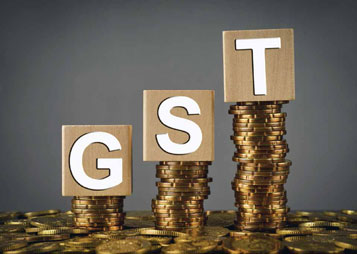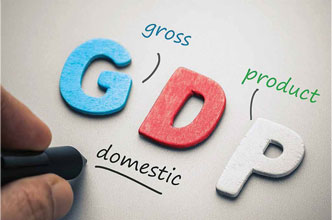Although many have blamed demonetisation and GST for the slowdown of the economy, these are temporary blips, and we will reap the real dividends as issues of implementation get ironed out.

Unlike the regular tax desk which is manned by a tax officer whose job is to levy tax on you, this desk is manned by a non-serving tax officer who wishes to share his experience of 35 years in the tax department, while, discussing tax provisions. It is advantageous to know how the tax department thinks and acts when, as said by Benjamin Franklin, “In this world nothing is certain except death and taxes”
We are a big country with more than 130 crore people, but have a dubious distinction of being the least tax-compliant country. More than 125 crore people do not file income tax returns, even when more than one crore people can afford to go for foreign tours every year. Amongst the people filing Income Tax returns, salaried employees account for more than 70% of the people. Of the 14 lakh companies registered, two lakh company registrations have been cancelled recently for being shell companies. Only about six-seven lakh companies file Income Tax returns. Under GST, the number of entities registered so far is about 85 lakh, which includes about 72 lakh of old assesses. The returns filed under GST so far have revealed that a large number of returns are zero tax returns
We all know that both for Union and state governments, the major source of income is taxation, both direct and indirect. With a small tax base, it is difficult to generate adequate income for our development, for our defence and for our welfare activities. We get constrained and have to borrow. We are forced to go for fiscal deficit, leading to all sorts of allied financial problems. The problem is not that people have no money, but the problem is that they do not want to pay tax, be it direct or indirect.
Recently, there has been a discussion on the state of the economy of our country. The trigger for the ensuing discussion was the sharp decline in our GDP to 5.7% in the preceding quarter when we have been the fastest-growing major economy in the earlier quarters during the last three years. Many intellectuals have found demonetisation and GST as the real culprits for the fall of the economy.
On the contrary, some have also held the view that the fall in the economy is a temporary manifestation due to major structural changes brought about by demonetisation and GST. Unfortunately the scholars who have demonised demonetisation and GST have not looked into the potential benefits emanating from them and their benefits which are already visible. We have to start looking within and ask questions to ourselves whether we have paid taxes honestly before criticising certain schemes like demonetisation and GST. Had we been honest taxpayers, these schemes of the government would perhaps have not been launched at all!
Demonetisation was brought in, in the backdrop of huge black money in our country, a part of which was suspected to be in cash, kept in hiding in the form of high denomination notes. Demonetisation has succeeded as almost all the high denomination currencies including that of black money kept in hiding has come back to the banks. The income tax department has already identified the quantum of black money which is about Rs.3 lakh crore, out of the total of Rs.15 lakh crore deposited. The owners and depositors of such black money have been identified, and the process of collecting evidence to pin down the tax evaders has started as per various reports published in the media.
Money once kept in the banks will have a trail as to where it is going. Even in the case of substantial cash withdrawals from the banks by the depositors, tax officers will be competent enough to ask where the cash withdrawn has gone. The problem of tax evaders who have deposited cash in the form of demonetised currencies starts now. The department can reopen cases under section 148 of the Income Tax Act. The department has enough time of six years to complete the process of assessment and reassessment. The tax, together with penalty, will be almost 90% of the cash deposited. The gain of revenue against Rs.3 lakh crore unaccounted cash will be quite sizeable in the coming years.
"The income tax department has already identified the quantum of black money which is about Rs.3 lakh crore, out of the total of Rs.5 lakh crore deposited. The owners and depositors of such black money have been identified, and the process of collecting evidence to pin down the tax evaders has started”
Some intellectuals have commented that since 99% of demonetised money has been deposited, there is no gain to the government, while at the same time the process gave a lot of hardship to the people. The intellectuals were wrong as their perception of the intended objective behind the demonetisation was wrong.
One visible benefit of demonetisation in the last few months is the steep growth in mutual funds and their high-value investment in the share market. Money which was earlier not going to the banks before demonetisation is now going to the capital market through the mutual fund route. These days the share market is at an all-time high through our domestic investment while not depending upon FIIs. Another visible benefit is that more income tax returns have been filed during the current year. People probably are gradually realising that it is better to show income to the tax department to escape unwanted worries, but still there is a long way to go.
The process of demonetisation got over long time back; hence it will be wrong to say that the effect of demonetisation continues to pull the economy down. It is an undeniable fact that demonetisation brought sudden hardship to the people for some time but it was well intended and ultimately it will strengthen our economy. Today the cash-GDP ratio is 9% as against 12% in the pre-demonetisation days and the same is an encouraging indication of a healthier economy.

The issue of GST has to be looked into from a different perspective. It is a historic tax reform in the field of indirect tax. The objective behind GST was to have one tax for the entire country and also to remove the cascading effects of multiple taxes of the Centre and states. The GST came into effect after 11 years of consistent efforts of different governments. Some time will be needed by the people to understand the new system. Unpleasantness is bound to be there for some time. Even the system of the government at the Centre and the states has so far not responded to the satisfaction of the people. Technical hitches have been seen, though efforts are being made by GSTN to correct the effects. It will not be untrue to say that though the objective of GST is praiseworthy, its implementation is not free from many doubts. It is an accepted fact that a new system always has teething problems. As per a conservative estimate, GST will settle down within one year and then will start giving the desired results for a healthier growth of the economy. The chaotic situation of disruption is temporary and its impact of slowing the growth rate at the moment will go away.
"One visible benefit of demonetisation in the last few months is the steep growth in mutual funds and their highvalue investment in the share market. Money which was earlier not going to the banks before demonetisation is now going to the capital market through the mutual fund route”
Some commentators have adversely commented about GST and its hasty unplanned launch. There is nothing wrong with GST and even its launch has not been as chaotic as some might have visualised. The situation at the moment requires strengthening our online system, which bears the huge burden and also reviewing the rules, procedures and tax rates so that taxpayers find the new system people-friendly. We see that the GST Council is sensitive to the problems faced by the people and corrections are coming on a monthly basis. Together with the people, even the government is in the process of learning and correcting mistakes.
It will be better if there is a clubbing of tax rates and there should not be more than three slabs. The ideal situation would have been one country and one tax rate, but as of today it may not be practicable, seeing the vast poverty in our country. The other suggestion is to bring all the goods and services under GST; petroleum and alcohol should not be kept out. GST should be one tax for the country in both letter and spirit.
"One very important gain from GST will be reducing corruption in the tax administration as now everything will be online and transparent. There will be a huge widening of the tax base as people will not be able to hide their income. It will also have an impact on inflation”

There is always space for healthy intellectual debate on the state of the economy in our country. It is natural for people to get concerned when the GDP falls, but people should not become pessimistic about it. The slowdown in the economy is due to the planned structural change which was undertaken after careful consideration.
One very important gain from GST will be reducing corruption in the tax administration as now everything will be online and transparent. There will be a huge widening of the tax base as people will not be able to hide their income. It will also have an impact on inflation. We can see that with GST, there is no price rise connected to the new tax system. In fact, in the coming months inflation will go down. The latest data shows that manufacturing activity is picking up and even export has improved after a considerable time. I do not think that there is any objective reason to be pessimistic.
The IMF and World Bank have also categorically said that in the medium and long term, India will be the fastest-growing economy in the world. The present disappointment is a by-product of structural reforms and the same will not continue, we should not heed the negative comments and proudly work harder for the betterment of our country. It is in our interest to project our country as a strong economy. FDI will come to our country only when India is seen and perceived as a strong economy. Commentators who present our country negatively are doing great harm to the country. Intellectuals will do well for the country if they come up with constructive suggestions for nurturing our economy, while at the same time remaining optimistic about the future of our country.

The economy of a country is dependent on many factors and one of which is the will of the people. See the case of Japan. The country does not have much by way of natural resources, the country was devastated by atom bombs during the Second World War, but today it is a big economic power. It was hard work and the will of the people that Japan is what it is today. Similar are the stories of many countries like South Korea and Switzerland. We have to learn from the people of these countries. We remain busy criticising each other without having a will and passion to make India a world economic power, we do not work hard, we don’t believe in scientific research and innovation to bring about technological revolution. A small country like Israel which is fighting for its existence, working in the field of scientific research has added a huge economic gain.
We believe that it is the job of the elected government to do everything while we will keep waiting for the benefits. The government cannot be more than a facilitator. We have to work hard to make our economy stronger. Our countrymen should start working to have a cleaner environment and this will help our country in many ways such as helping our tourism industry, eradicating diseases, and promoting a healthy life. Money wasted on drugs can be used in a more productive manner. The government is nudging us for a swachh country, but this can be done only by the people. We should transform ourselves from being argumentative Indians to becoming patriotic Indians and our country will grow economically. Our patriotism should manifest in the work of nation building and not just in raising slogans.
by S K Jha